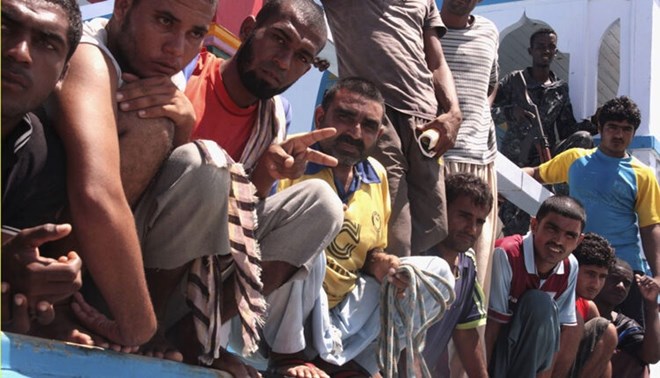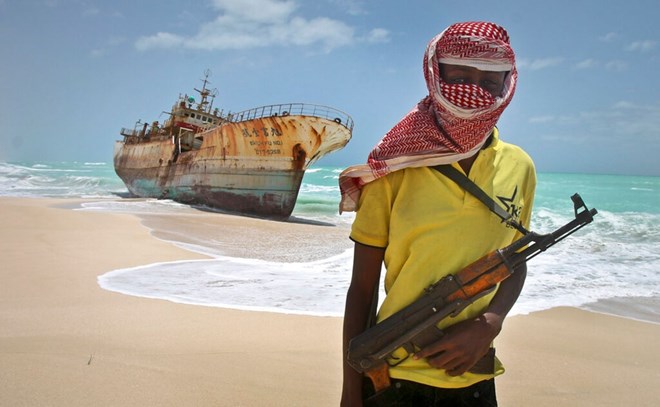
Thursday July 29, 2021

Iranian fishermen crouch on the deck of their vessel after being detained for illegally fishing in Somali waters. REUTERS
Just as one maritime security challenge in Somalia seemed all but resolved, another one gained momentum.
After years of declining pirate attacks off mainland Africa’s longest coastline, the country is now fighting to rid its water of illegal foreign trawlers. Experts fear Somalia is in the throes of a cycle of sea crime that threatens its food supply, economic stability and ecosystems.
The organizations’ data, gleaned by analyzing the vessels’ use of Automated Identification Systems, showed that 192 Iranian vessels were involved in IUU fishing in Somalia in 2019 and 2020. The foreign vessels typically trawled in waters reserved for local artisanal fishermen.
More than a dozen countries fish illegally in Somali waters. China has more than 30 vessels licensed to fish there for tuna but has also been found to engage in IUU fishing activities. According to the Global Initiative Against Transnational Organized Crime (GIATOC), China is the world’s worst IUU offender.
Duncan Copeland, chief analyst at Trygg Mat Tracking, told the United Kingdom’s The Guardian that the scale of IUU fishing in Somalia is “staggering.”
“We are seeing such large numbers of vessels” Copeland told the newspaper. “It is beyond what any management plan can cope with. It’s way too much fishing effort for the region. It’s going to deplete stocks.”
Somalia’s nearly 3,400-kilometer coastline, which includes Gulf of Aden, Guardafui Channel and Western Indian Ocean waters, is extremely difficult to police.
Many foreign vessels in Somalia engage in the same illegal tactics used by foreign trawlers in other parts of Africa, such as using gillnets to catch fish off the ocean floor and tossing bycatch — unwanted dead fish — back into the sea. Those actions damage ecosystems and threaten the sustainability of valued species, including grouper, snapper, mackerel, shark and tuna.
That’s a concern because the United Nations has reported that an estimated 5.6 million Somalis face acute food insecurity.
Links to piracy
For years, maritime security experts have warned of a link between IUU fishing and piracy. This occurred in West Africa, where increasing pirate attacks in the Gulf of Guinea have coincided with a massive influx of illegal foreign trawlers, mostly Chinese, which are robbing the region of vital sources of food and income.
A report released last year by Secure Fisheries — an arm of One Earth Future, a U.S.-based nonprofit, nongovernmental organization — found that conflict between Somali fishermen and foreign fleets soared from 1998 to 2000.
The pirates struck with abandon in the 2000’s and early 2010s, launching hundreds of attacks on commercial ships, typically kidnapping crew members for ransom, Voice of America reported. When foreign navies began patrolling Somali waters more heavily, the threats declined. By 2016, the International Maritime Bureau recorded only two pirate attacks near Somalia, neither of which resulted in a hijacking.
But as piracy decreased, foreign fishing trawlers returned. Although pirate attacks remain extremely rare, observers worry about a resurgence. According to the GIATOC, Somali-based pirates cite the presence of foreign trawlers as justification for continued attacks.
A Somali pirate guards a Taiwanese fishing vessel that washed ashore after its crew was kidnapped for ransom. THE ASSOCIATED PRESS
The initiative also found that foreign fishing operations are frequently facilitated by Somali agents — often in cooperation with government or quasi-government actors, who provide fishing licenses, flag registrations, falsified export documentation and armed onboard security for a fee.
Shafi ‘I Hussein Muse, dean of the fishery department at Berbera Maritime and Fishery Academy in Somaliland, corroborated the GIATOC’s findings.
“Some of them are fishing without holding any fishing licenses, while others have managed to get licenses issued illegally by corrupt officials, mostly in the ministry of fisheries both at the state and federal levels,” Muse told Hakai magazine, an online publication that explores science, society and the environment from a coastal perspective.
To address maritime security issues, the GIATOC recommended that Somalia’s Financial Governance Committee establish meaningful checks and balances on the issuing of fishing licenses, flag registrations and other documentation and enforce legal consequences on government officials who have profited from IUU fishing schemes.
The initiative further recommended that the government improve maritime cooperation and share information with international partners, such as the Indian Ocean Tuna Commission, the European Union Naval Force and the U.N. Food and Agriculture Organization.
In mid-July, Somalia’s Fishing Ministry drafted a law to standardize the regulation of fishing licenses, counter corruption and enhance environmental protection.
“We are also strengthening the intergovernmental coordination within our country and with other maritime agencies,” Mohamud Sheikh Abdullahi, Somalia’s director general of fisheries told Kenyan newspaper The Daily Nation. “The confusion caused is because of the new federal structure which, as you may know, has not yet been updated to determine where federal and state powers begin and end.”
The law is expected to be implemented after national elections conclude in October.